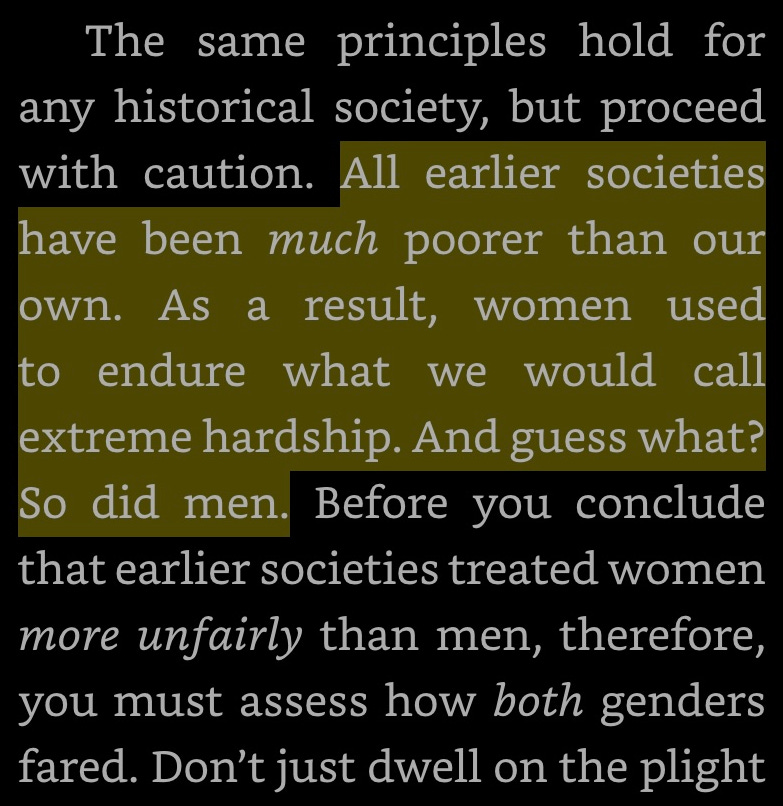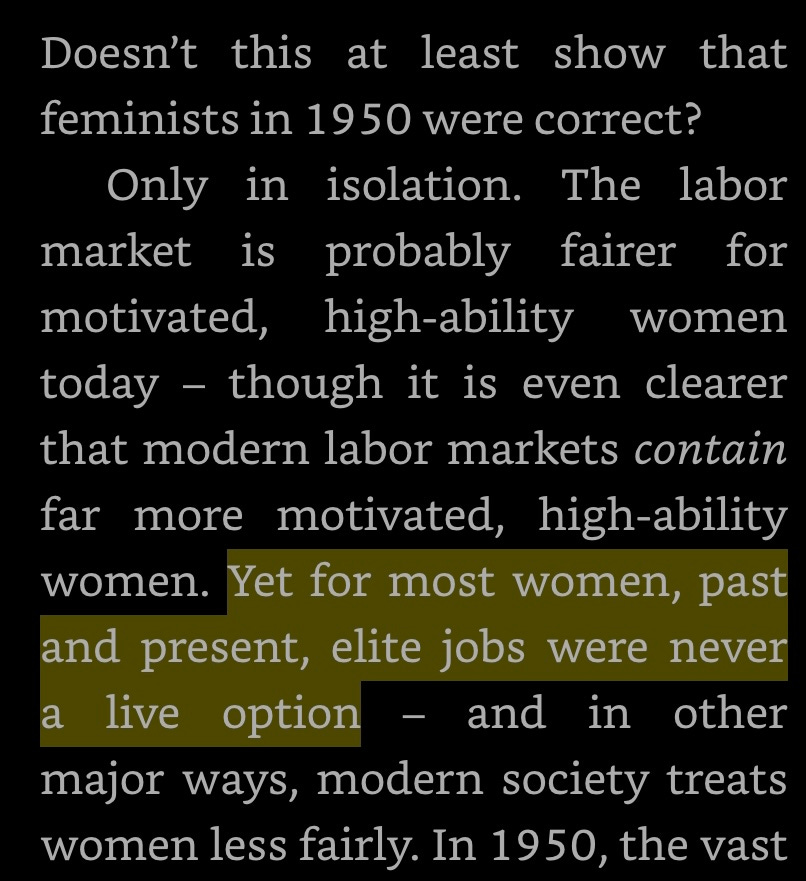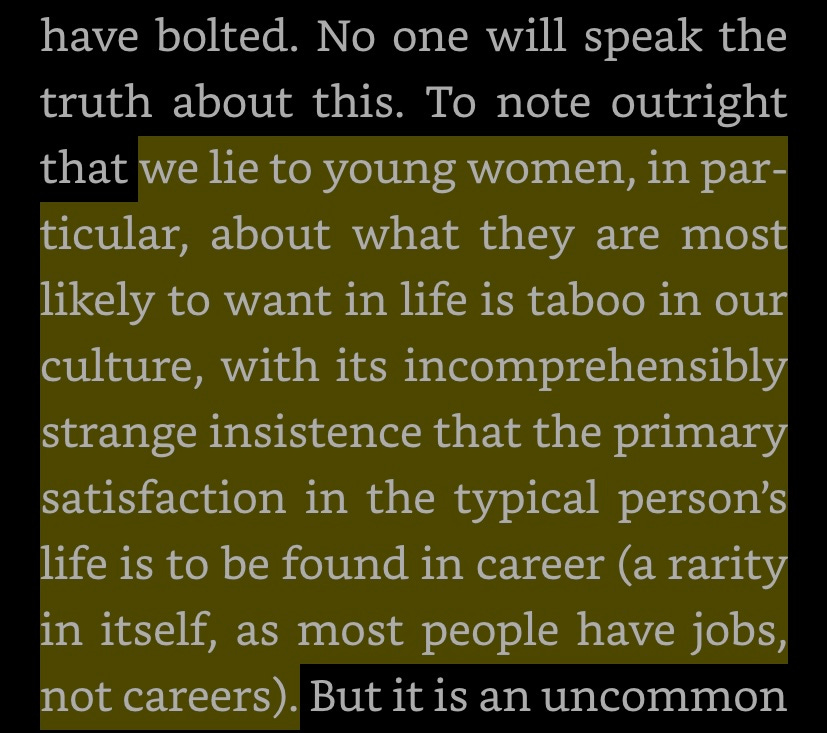Conversation with Caplan
Reflections on my first podcast, a "great man theory" for why Scott Aaronson was mobbed while Bryan was not, and mental ordering as an explanation for the unobservable value of education
Early yesterday morning, Time Well Spent published my first live interview—a very fun conversation with the excellent Bryan Caplan.
Recommended. I start with this question to give a good jumping off point to readers unfamiliar with Bryan’s general argument.
About half of respondents felt they were assigned to low-level tasks that men were not, 2/3 reported unwanted sexual advances from a superior, and 9 in 10 reported seeing sexist behavior at work.
Many people see this as evidence for Feminism. Why do you disagree?
For readers more familiar with the broader Caplan worldview, I try to provide some interesting challenges to Bryan based on his previous books. For example, I ask him:
Whether his lead essay can succeed in persuading his daughter not to be a Feminist, given his skepticism that parental nurturing has any lasting impact on the views children hold about politics and religion in general.
Why he doesn’t put much weight on natural experiments economists claim as evidence for race and gender discrimination.
Whether adopting his broader set of views in their totality would raise or lower the status of women, since the areas in which women are most dominant (education, “tiger parenting”, and some domains of politics such as non-profits or activism) are also areas that Bryan believes are vastly overrated.
On this last point we talked past each other a little bit because I didn’t initially make the question concrete enough to be entirely fair. Still, I think the question is worth thinking about.
Here is a short excerpt of that discussion:
Infovores 25:15
Maybe I can make it a little bit more concrete kind of what I had in mind.
So whenever I come across a woman who is say, a preschool teacher, she brings that up, and everyone is just overjoyed. Like that's the best possible thing that you could be doing with your time, you're a wonderful person, and that really takes priority over anyone else's career or accomplishments. And it seems like naturally if you just say that education actually should be a lot lower status than that, it has to lower women's status in some way.
Bryan Caplan 25:53
I mean, if you read the book, I actually did single out preschool teachers as my favorite educators, precisely because they are providing the unquestionably useful service of daycare rather than the debatable service of actually trying to go and put knowledge into kids’ heads.
I can see what you're saying, but I think the general tone tone of my work is so natalist and so favorable to people that are having kids and doing stuff for kids that I wouldn't think that would be a reasonable take on it. Someone could go and interpret it that way. I do know that once I gave a talk, and then someone came back and told me that a mom cried after hearing me talk. That was not what I had in mind at all! I'm really grateful to moms having kids. And I also want to encourage them to not feel bad about themselves when they have time for themselves and enjoying their own lives. And not feel like they're shortchanging their kid just because they go and have their own hobbies and activities.
Hopefully it comes across throughout the conversation that I truly love and appreciate Bryan, both as a person and as a thinker that forces me to think very differently than I would have about a lot of topics in a world unlucky enough not to have him. You should be reading him regularly!
A Great Man Theory of Caplan and Aaronson
On a related topic, Scott Aaronson wants to know why he was mobbed for critiquing Feminism back in December 2014 while Bryan gets off scot-free today—
How is it that I got denounced by half the planet for saying once, in a blog comment, that I agreed with 97% of feminism but had concerns with one particular way it was operationalized, whereas Bryan seems to be … not denounced in the slightest for publishing a book and going on a lecture tour about how he rejects feminism in its entirety as angry and self-pitying in addition to factually false? Who can explain this to me?
Many in the comments point to the fact that Scott Aaronson is plausibly left-of-center, which puts him in the worst possible position for avoiding in-group ire.
I think there is something to this idea, particularly given the modern left’s obsession with identity politics based on historical victim groups. At a recent free speech conference at Stanford, Tyler Cowen advised academics in a similar position to simply leave the left to avoid such problems. “If you’re a right-winger, they will not cancel Satan!” (33 minute mark)
But to me there is another simple but important reason why Bryan is so much less the pariah for his views on feminism in 2022 than was Scott Aaronson circa 2014/15. Back then, Jordan Peterson had not yet arrived on the scene.
How does Jordan Peterson’s rise, which begins toward the end of 2016 and explodes in January 2018, map to the cultural dominance of Feminism? According to the previous literature on this question (i.e. Scott Alexander’s blog), quite well.
There was a really interesting period in 2016 when the media was trying to decide whether to unite in character-assassinating Peterson the same way it had character-assassinated all previous people in this space, or treat him as some sort of interesting and potentially sympathetic phenomenon, and it decided on the interesting phenomenon angle. After that, being anti-SJW lost about 90% of its stigma, to the point where people would roll their eyes instead of freaking out. This New York Times article on the Intellectual Dark Web essentially turned the semi-respectability of anti-SJWism into common knowledge.
And here is Alexander’s more polished chart for Feminism, showing a plateau in interest from 2014-2016 followed by a clear decline.
I would call all of this suggestive evidence rather than a precise proof of Peterson’s importance here, but it seems quite plausible to me that Bryan had a much easier path than he would have without him. On my initial read of Bryan’s book, I was struck by how similar some of their arguments on this topic really are.
Both highlight overlooked ways in which men have things worse than women…
Both emphasize the suffering inherent to the historical human condition…
And both believe culturally imbibed feminist ideals favor the concerns of elites over those of most women.
While Bryan is often one of the primary people pushing out the boundaries of discussion on topics he writes about, here he is in many ways operating within an Overton window that Jordan Peterson busted wide open.
The Importance of Mental Ordering
If I may indulge in just a little more self-promotion on Caplan related topics, here is a piece I wrote (again for Time Well Spent) that relates to one of the arguments we discuss on the podcast.
While this is really just an old email I wrote long before I ever thought about joining the blogosphere, I think it reads well enough to make me wonder if I majorly over scrutinize what I publish sometimes. Am I self-censoring too much? I feel that I ought to be much better at this by now than I was then, but I digress.
Bryan convincingly shows in “The Case Against Education” that students retain very little of the concrete knowledge they learn in school. They spend years on foreign languages they can’t speak more than a few words of, they fail basic tests of numeracy and scientific fact, and most people never wind up in jobs related to what they explicitly took classes on anyway. For most people, most of the time, it’s hard to argue that education makes people more productive (and thus higher paid) by teaching them tangible things that are easy to measure.
Bryan concludes that if we can’t design a test to show what students retain then there really can’t be much. But I’m not fully convinced. Like Tyler, I see the process of mental ordering as central to gaining knowledge and intelligence.
The key insight of my short essay is that effective learning does much more than simply add to the individual pieces of information that you already know. In subtle and hard to discern ways, it helps to organize the broader ecosystem of the mind toward more productive ends.













The apostate is sanctioned much more severely than a heretic
Re your point at the end about mental ordering being important for gaining knowledge and intelligence, if we have lots of evidence for very little knowledge gain, why assume we have any mental ordering going on? If there are intangible things happening that lead to tangible benefits downstream we put to be able to see those benefits downstream at some point, even if in an attenuated way.
I see the argument that schools teach kids to love learning, or teach them to learn to learn. Yet if the kids don’t love learning enough to read, or learn details and subjects, what evidence do we have that they are getting any benefit to their ability to learn?